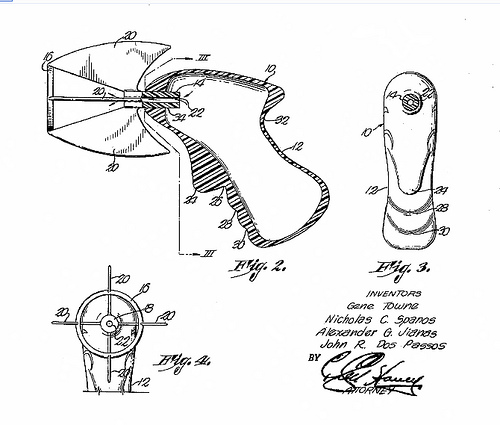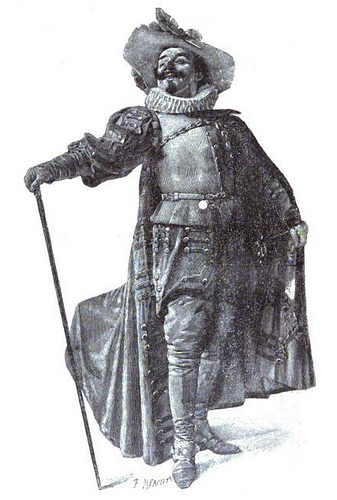- Jimmy Carter was the first U.S. president born in a hospital.
- Hamlet has 1506 lines, fully 39 percent of the play.
- 736 = 7 + 36
- NOOK combines two antonyms.
- “Everything that deceives may be said to enchant.” — Plato
Literature
Unquote
“I always find it more difficult to say the things I mean than the things I don’t.” — Somerset Maugham
Strike Three
After cataloging her disappointment with Europe, Asia, and Australia, xenophobic travel writer Favell Lee Mortimer finished her world survey with Far Off, Part II: Africa and America Described (1854). What did she discover about the intriguing people and exotic customs of these remote continents?
- “It is a rare thing in Egypt to speak the truth.”
- “Those who wish to visit Nubia ought to go there in a boat, for there is no other pleasant way.”
- “Perhaps there is no Christian country in the world as ignorant as Abyssinia.”
- “Cruelty is the chief vice of the Caffre.”
- “Newfoundland is a dreary abode.”
- “Though Mexico is so beautiful at a distance, yet the streets are narrow and loathsome, and the poor people, walking in them, look like bundles of old rags.”
“Washington is one of the most desolate cities in the world: not because she is in ruins, but for the opposite reason — because she is unfinished. There are places marked out where houses ought to be, but where no houses seem ever likely to be.”
Dueling Chameleons
Author Octavus Roy Cohen was visiting a friend in Colorado when the surprising word came that Cohen himself would be speaking at a men’s luncheon club in Denver. Bewildered, the two attended the luncheon and watched an impostor give a “splendid literary talk.”
After this, the program director announced a surprise guest — Edna Ferber. Cohen had always wanted to meet Ferber, but to avoid embarrassing the club he held his peace and watched his impostor trade compliments with the guest author.
On his next visit to New York, he called Ferber. “I’m Octavus Roy Cohen,” he said, “the man you thought you met recently in Denver –”
“What are you talking about?” she said. “I haven’t been in Denver in years.”
A Side Project

In 1959, John Dos Passos took a break from writing to invent a bubble gun, presumably for his 9-year-old daughter, Lucy:
The primary object of this invention is to provide a bubble toy in the nature of a pistol … upon squeezing the hand grip air is forced … toward the ring, causing bubbles to be formed from a film held by the ring, and the bubbles projected forwardly as bullets from a gun.
After this he went back to the typewriter — Prospects of a Golden Age was published in the same year.
Hope and Change
One dollar and eighty-seven cents. That was all. And sixty cents of it was in pennies. Pennies saved one and two at a time by bulldozing the grocer and the vegetable man and the butcher until one’s cheeks burned with the silent imputation of parsimony that such close dealing implied. Three times Della counted it. One dollar and eighty-seven cents. And the next day would be Christmas.
That’s the first paragraph of “The Gift of the Magi.” Does it contain a blunder? If Della has $1.87, and pennies make up 60 cents of it, what constitutes the remaining $1.27?
There are two possibilities. The story doesn’t say that only 60 cents of the total was in pennies; possibly 62 cents was, though this makes Della’s observation seem pointless. The second possibility is that the story is set in the late 19th century, when the United States was still minting two- and three-cent pieces — though there’s no other indication that this is the case.
So is it a blunder? Only O. Henry knows for sure.
The Brightest Heaven of Invention

Shakespeare said everything. Brain to belly; every mood and minute of a man’s season. His language is starlight and fireflies and the sun and moon. He wrote it with tears and blood and beer, and his words march like heartbeats. He speaks to everyone and we all claim him but it’s wise to remember, if we would really appreciate him, that he doesn’t properly belong to us but to another world; a florid and entirely remarkable world that smelled assertively of columbine and gun powder and printer’s ink, and was vigorously dominated by Elisabeth.
— Orson Welles, Everybody’s Shakespeare, 1934
Thornton Wilder called this “the greatest thumbnail summation of Shakespeare’s genius ever written.”
Print Charming
During the Depression, magazines and newspapers regularly carried advertisements for “talent bureaus” promising to assess the writing of undiscovered authors. Sensing a scam, Author & Journalist editor Willard Hawkins asked his daughter to compose “the most impossible, inane and childish semblance of a story that it was possible to conceive.” She obliged with “Her Terrible Mistake,” the story of 17-year-old Mary Jane Smith, who “fell devinely in love with a very nice fellow who was a machinic by the name of Jack Berry.” When a stranger seduces Mary Jane, her “fionce” exposes him as “a villian in sheeps clothing.”
Universal Scenario Co. of Hollywood declared this “admirably suited to talking picture presentation” and for $10 offered to submit it “personally to those producers whose current production demands call for this particular type of story.”
Encouraged, Hawkins now had Lottie Perkins write a 30,000-word novel, The Missing Twin:
‘Mr. Jones I think something has happened at home. I think we ought to have left someone to take care of our children. What will I do if someone has kidnapped them out from under my nose. How can you sit there and let them be stolen from me. O my babies. How could anyone be so crule as to steel you.’
Economy Publishers of Tacoma, Wash., read this “with ever increasing pleasure and admiration for the author. My! how your characters live and breathe and walk out into the room before one … !” They agreed to publish the book for $375, returning 40 percent of all royalties to Perkins.
In the end, Author & Publisher found that in most such cases, the publisher printed only about 100 copies — and profited $200.
Sublime, Ridiculous

Amazingly, Cyrano de Bergerac was banned from the United States for 15 years because a federal judge decided that Edmond Rostand had plagiarized it from a Chicago real estate developer.
The developer, Samuel Gross, had written The Merchant Prince of Cornville in 1896 and had 250 copies printed privately. In 1900 he brought suit in U.S. district court, and Judge C.C. Kohlsaat ruled that Rostand was “a plagiarist and by inference a perjurer” for “obviously” borrowing from Cornville and then denying he’d ever heard of it. The judge issued a perpetual injunction against the production of Cyrano in the United States.
So was Rostand guilty? Decide for yourself — here’s a sample of the work he “stole”:
Violet: I thought I heard some one speak, but not from underground, for he’s not a goblin; nor yet from the sky, for he’s not an angel; nor yet from the earth, for no dreadful man is near. Why, what is that in the sky? ‘Tis last eve’s moon, that will not to her couch by day. To rest! pale planet. Oh gentle moon, where is thy blush? Thou art dismantled by the roseate sun. Alack! what divine dramas are there in the skies!
The ban was eventually overturned: In 1915 Gross failed to stop an operatic production of Cyrano, and in 1923 the original play was revived successfully. I’m not really sure what happened to The Merchant Prince of Cornville.
The Malcontents Abroad
In 1852, two years after condemning all of Europe, cranky Victorian travel writer Favell Lee Mortimer turned to the east for Far Off: Asia and Australia Described. What did she learn of the colorful people, rich history, and sophisticated cultures of these exotic lands?
- “The reason why the Armenians live in holes in the ground is because they hope the Kurds may not find out where they are.”
- “It is impossible to trust a Persian.”
- “The Buddhists are full of tricks by which to get presents out of people.”
- “The Chinese are very selfish and unfeeling.”
- “The Arabs are so unforgiving and revengeful that they will seek to kill a man year after year.”
- “In disposition the Siamese are deceitful and cowardly.”
- “It must be very terrible to live in the midst of such murderers as the people of Bokhara seem to be.”
And: “All the religions of China are bad, but of the three, the religion of Confucius is the least foolish.”
